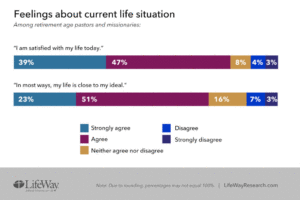By Aaron Earls
LifeWay News Office
 NASHVILLE — Most retirement age pastors and missionaries say their current life is close to ideal, but some who have entered retirement say they could’ve been better prepared.
NASHVILLE — Most retirement age pastors and missionaries say their current life is close to ideal, but some who have entered retirement say they could’ve been better prepared.
In a survey sponsored by Shepherd’s Fold Ministries, Nashville-based LifeWay Research asked 2,451 pastors, ministers and missionaries who were retired or at least 67 years old about their life, health, relationships, reflections on ministry, and how they’ve adjusted to their current life stage.
“Our number one goal is to provide relevant resources to help retired ministers,” said Brent Van Hook, director of Shepherd’s Fold Ministries. “The results of this study show specific ways retired ministers can experience genuine higher well-being related to social, spiritual, physical and financial health.”
Out of those ministers or missionaries surveyed, 8 in 10 (81 percent) are currently retired or mostly retired. Around half (52 percent) have been in ministry 40 years or longer, with 35 percent serving 40 to 49 years and 17 percent serving 50 years or more.
The vast majority think fondly about their previous ministry. More than 9 in 10 (92 percent) say they are satisfied with their ministry efforts before retirement, with 59 percent saying they are very satisfied.
Physical health
In describing their overall health, 72 percent say they are active and healthy, while 14 percent say they have physical disabilities that limit them, and 12 percent say their spouse has such limitations.
Fewer retirement age ministers say their spouse has been diagnosed with a mental illness like depression, dementia or Alzheimer’s (5 percent), they spend a significant amount of their time caring for the health of someone with disabilities (5 percent), or have been diagnosed with a mental illness themselves (3 percent ).
Around 4 in 10 (41 percent) agree having more help with their own health or the health of someone they care for would help at least a little.
Finances
Three-quarters (76 percent) of retirement age ministers are confident they will have enough money to live comfortably through retirement, with 31% saying they are very confident.
Still, almost half (47 percent) say they are often concerned about the financial security of their family and 27 percent say their physical needs or those of their spouse have caused significant financial strain.
More than half (55 percent) say their household’s current annual income is less than $60,000. Slightly more than a third (36 percent) have less than $100,000 in retirement savings.
Virtually all retired ministers (94 percent) receive Social Security benefits. Around 3 in 5 (59 percent) have a pension plan with their current or former employer.
Four in five (81 percent) say they currently live in a residence they own, while 10 percent rent, 3 percent live in a residence provided by a church or ministry, 3 percent live with family and 1 percent live in an assisted living facility.
Three in 5 (59 percent) say they currently have some form of debt, the most common being a mortgage (37 percent), a car loan (27 percent) or credit card debt (20 percent).
Retirement age pastors and missionaries are most likely to say they need help managing retirement funds (22 percent), finding work suitable for retired ministers (17 percent) or learning how to stretch their current resources (16 percent).
“The fact that most pastors and missionaries feel financially ready for retirement doesn’t negate the fact that a quarter are not in a good position,” said Scott McConnell, director of LifeWay Research. “Health issues have complicated the financial picture for many of those with financial strains.”
Preparation for retirement
Among those who are currently retired, 76 percent say they were prepared for the adjustment to retirement. Seven in 10 (70 percent) say the transition was easy.
The most common approaches to preparing for the transition were speaking with others who had retired (46 percent), reading articles on the topic (42 percent), or attending a retreat or conference for those nearing retirement from ministry (26 percent). One in 5 (20 percent) say they did not prepare for the transition at all.
Still, 33 percent say they have struggled with the adjustment, and 28 percent feel they lack purpose since they retired from the ministry.
Almost 2 in 5 (39 percent) say they have had to rethink their sense of value and worth since retiring and 27 percent say that retirement forced them to think about their value to God.
When asked an open-ended question about what advice they would give those retiring from the ministry in the future, those currently at retirement age most frequently said to save and plan financially (13 percent), plan ahead (10 percent), enjoy and embrace retirement (8 percent), be prepared (7 percent), find opportunities to volunteer or serve (6 percent), stay active (4 percent), trust God (4 percent), pray (4 percent) and develop interests or hobbies (3 percent).
